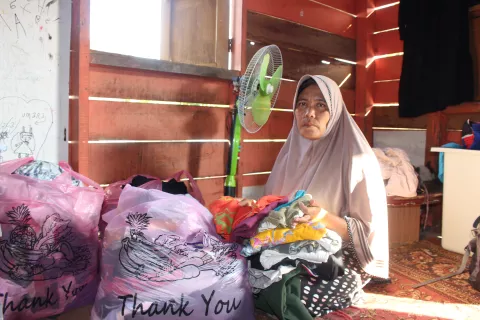BAPPENAS Aims to Strengthen Support for Vulnerable Children and Families
New Report Proposes Improvements for Indonesia’s Largest Socioeconomic Database

- Available in:
- English
- Bahasa Indonesia
Jakarta, 25 April 2024 – The Government of Indonesia, in collaboration with UNICEF, today released a report that underscores the key role of data to strengthen social assistance to poor and vulnerable families nationwide.
The Integrated Socioeconomic Registration System Design report outlines how Regsosek, Indonesia’s latest integrated database, can improve the government’s delivery of social protection support for children and families affected by poverty and the impact of emergencies.
Launched in 2022 in collaboration with UNICEF, Regsosek aims to improve the targeting of beneficiaries and distribution of social protection benefits for those most in need, using socioeconomic data that has been collected nationwide.
The new report by the Ministry of National Development Planning (Bappenas ), prepared with support from UNICEF, outlines a series of recommendations for Regsosek to provide social protection support in ways that are faster and more effective. This includes use of the registry by all social protection programmes at national and sub-national levels and ensuring periodic updates of data.
"For social protection programmes to be successful, they must be guided by reliable and continuously updated data,” said Bappenas Deputy Minister for Population and Employment, Bapak Maliki.
“With the data collection completed by the government in 2023, Regsosek now covers almost 271 million people, which is approximately 95 percent of Indonesia’s total population. This is a very significant step forward to improve our accuracy with planning, budgeting and service delivery for the most vulnerable members of society. Regsosek is the latest in Indonesia’s series of progressive reforms for social protection.”
“Globally, Indonesia is one of the few countries that has taken an exemplary decision to establish a socioeconomic registry, designed to improve the management of social protection and reduce poverty rapidly,” said Maniza Zaman, UNICEF Indonesia Representative.
"The recommendations in this new report provide an important blueprint for identifying and reaching families that have the most critical needs. When we support these families, we protect children – the nation’s most important investment. Realizing Indonesia’s vision for 2045 depends on our collective ability to realize the rights of every child and help them reach their fullest potential."
Regososek builds on the efforts of existing databases such as the Unified Database (DTKS) and Targeting Data for the Acceleration of Extreme Poverty Elimination (P3KE). The government intends to make Regosek compatible with other national databases, such as population administration, social security and education management information systems.
# # #
Media contacts
Deputy Minister for Population and Manpower BAPPENAS
Ministry of National Development Planning or BAPPENAS vision to “Conduct High Quality and Credible National Development Planning to fulfill the vision of an advanced Indonesia that is sovereign and independent, based on the ideals of cooperation and partnership”. The Deputy for Population and Manpower BAPPENAS conducts planning and budgeting for issues related to poverty alleviation, social protection, community empowerment, employment, SMEs development, and inclusivity. The Deputy leads some initiatives, including the development of the Social Economic Registry (Regsosek). Follow our activities on Instagram @regsosek.ditpkpm
About UNICEF
UNICEF works in some of the world's toughest places, to reach the world's most disadvantaged children. Across more than 190 countries and territories, we work for every child, everywhere, to build a better world for everyone.
For more information about UNICEF and its work in Indonesia, please visit: https://www.unicef.org/indonesia/
Follow UNICEF on Twitter, Facebook, Instagram, Tiktok and LinkedIn




